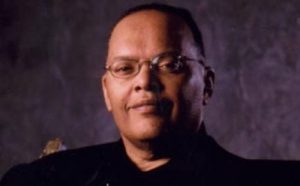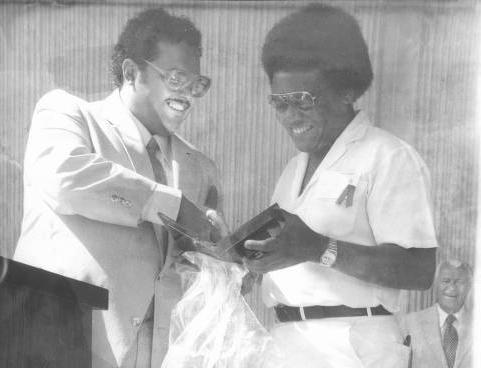
Photo info ...
Credit: Indianapolis RecorderView Source
(Jan. 11, 1948-July 12, 2004). Born in Indianapolis, Charles Williams attended and graduated from Hirsch High School in Chicago, Illinois. He received a bachelor’s degree from the Martin Center College of Religion and received honorary doctorates from the and , both located in Indianapolis.
He received a Navy commendation certificate in 1965 and was honorably discharged in 1968 from his duty in Vietnam. Williams returned to his birthplace after military service and served as special assistant to Mayor . This opportunity opened the path for Williams to strengthen the African American community by introducing minority small-business owners to leaders in major corporations.
Williams pushed for ways to use his position in the city government to benefit African Americans. It was Williams who created the first citywide National Black History Month celebration in Indianapolis after President Gerald Ford enacted February as National Black History Month in 1976. He chaired the PUSH for Excellence month (an initiative led nationally by civil rights leader Jesse Jackson to reform inner-city schools) and promoted the (NAACP) Convention.

In 1983, Williams resigned as special assistant to Mayor Hudnut to become the first paid president of Black Expo. He helped the group emerge from a $160,000 deficit and grew the single-day annual event at the Indiana State Fairgrounds to an organization that promoted year-round education, opportunity, and peace among people of all races.
During Williams’ tenure as president of (IBE), he founded the football game. The annual event brings to Indianapolis historically Black colleges to play in what has become the second-largest Black college football classic in the nation. Since its inception, the event has raised nearly $1 million for college scholarships for needy recipients.
The scope of Williams’ reach extended beyond his work with IBE. Later, in 1987, Williams became an ordained Baptist minister. He spent time as an associate pastor of . He also cofounded a group working to establish the Museum of African American History at .
Williams worked with the , the Downtown Promotion Council, the Indiana Convention and Visitors Association (), the Indiana Christian Leadership Conference, the White River State Park Development Commission, the (GIPC), the Black College Hall of Fame, and the Pacers Foundation.
Williams chronicled his two-year battle with prostate cancer in his book, That Black Men Might Live. The Marion County Public Health Department uses the Rev. Charles Williams prostate mobile unit to educate and examine men to detect the cancer early.
Williams honors included the Sagamore of the Wabash Award, the Distinguished Service Award, the Living Legends in Black Award, and the Congressional Lifetime Achievement Award.
In 2015, led the effort to establish the Rev. Charles R. Williams Park on a plot of land near Fall Creek Parkway. Slated to include a playground, parking lot, performance shelter, and a trail connected to the and the , the plot of land lays vacant in 2020, with progress stalled by the pandemic.

Help improve this entry
Contribute information, offer corrections, suggest images.
You can also recommend new entries related to this topic.